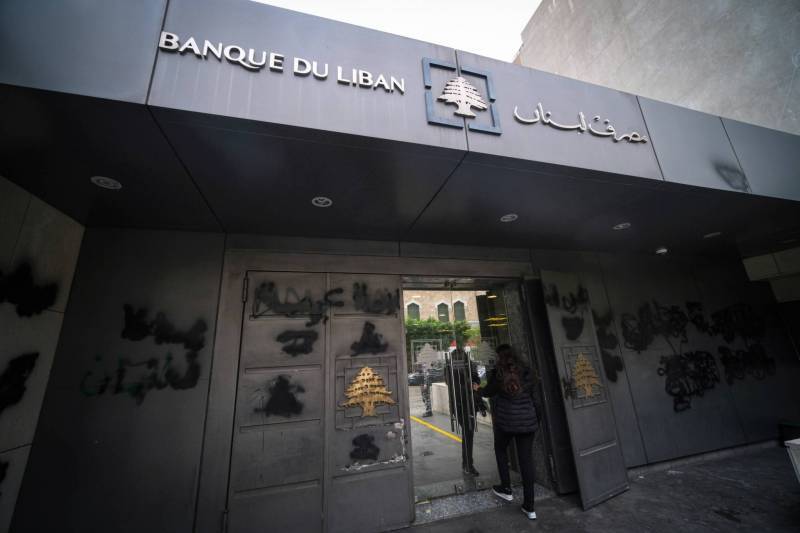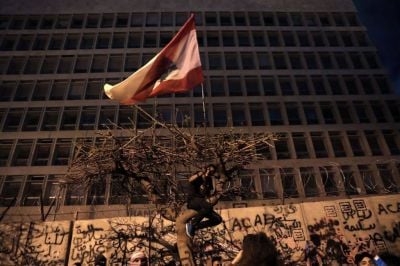
According to the balance of payments report, published monthly by BDL, an average of almost $1 billion per month is walking out of the country from the central bank. (Credit: João Sousa/L’Orient Today)
A senior public official recently told me that foreign currency reserves at Lebanon’s central bank were now close to $16 billion. The term “reserves” is actually a misnomer, implying that this is extra, discretionary money. To be precise, these are the gross reserves, because net reserves are negative, as Banque du Liban owes banks way more than the remaining reserves: $62 billion according to the Fitch downgrade report from the summer of 2019, but I now estimate that figure to be $80 billion.
More precisely, these reserves are the remnants of the $112 billion in dollar-denominated savings at banks, ultimately belonging to Lebanese depositors. At this level, they are now sometimes referred to as “mandatory minimum reserves” and defined as the 15 percent of deposits required by banks to be held at the central bank. BDL Gov. Riad Salameh recently stated that he’s close to reaching this level and thus cannot continue the subsidies program.
The role of the mandatory reserves is ostensibly to protect the banking sector from a shock to the system, à la the Intra Bank collapse in 1966. Today, pretty much every single Lebanese bank is Intra, so they’re no longer sufficient to bail out the system. Thus, the role of the reserves has devolved to something else — they literally keep the country functioning, by funding things like Électricité du Liban diesel requirements to keep our lights on at night, furnaces heating our homes and gasoline running our cars and buses.
To understand the banking situation better, we need to go back to our neuvième grade-school arithmetic classes, when we were introduced to the concept of “subtraction.”
Subtraction is very useful for us to understand our current predicament, so let’s use it liberally. If Salameh is saying he refuses to spend the last 15 percent, what can we deduce through subtraction?
That’s right. The first 85 percent has been spent.
Using subtraction again, we can do an analogous analysis on Circular 154 (issued in August last year), one component of which requires banks to repatriate in “fresh” dollars the equivalent of 3 percent of their deposits, which necessarily implies, even if successful (which, at the time of writing, they have not been), that they’re still missing 97 percent.
According to the balance of payments report, published monthly by BDL on its website, an average of almost $1 billion per month is walking out of the country from the central bank. According to various official reports, which are often self-contradictory, maybe half is being used on subsidies, mainly fuel, which, using subtraction again, means that the rest is exiting for unexplained reasons (escapes by members of the exclusive Super Wasta Club).
We are now at a fork in the road. If we continue on our current path, at this rate, if we don’t make drastic changes in our monetary policies and societal practices, BDL’s cash reserves will be consumed within 16 months. At that point, we would have to sell our gold, and assuming that eurobond holders don’t pick that perfect time of vulnerability to file a lien against that gold, that would buy us another, say, 17 months, based on the value of gold holdings as of the last BDL balance sheet report.
In other words, if we have a three-year lifeline, we are consuming it at the rate of 3 percent per month … or watching a train wreck in slow motion.
So what happens at the end of two to three years? Basically, all evidence of a civilized 21st century existence ceases to exist. The few hours of electric current that the government provides gets shut off. Hospitals run out of basic supplies. Food imports become the purview of the rich or lucky few earning real dollar salaries (by working for the UN or foreign NGOs), or those who who have relatives working overseas sending them dollar remittances, turning us into nothing more than a welfare state.
At the fork in the road is also the path to salvation. An equitable distribution of losses would free up our remaining cash and gold assets to rebuild the economy around productive foundations, instead of maintaining the lazy, consumption-based rentier economy, given an injection of life periodically through charity and handouts that masquerade as investment conferences.
What would a solution look like practically? Despite all the blunders and destructive procrastination, we still have the resources to make whole 85 percent of all depositors, i.e. pay them back every last dollar in full. A year ago, we could have saved 98 percent of depositors, so this ain’t like wine — it don’t get better with time.
The solution for the remaining 15 percent is a combination of the following measures. First, folks who earned obscene, fake interest rates on their dollars (15 percent, 20 percent, 25 percent, and even 31 percent) would have their claims reduced to a reasonable amount.
For example, if you earned 26 percent on $1 million from the year 2016 to 2019, thereby doubling your $1 million, only $1.1 million of your claim would be recognized instead of the full $2 million that you believed you had from the ponzi scheme of our Disneyland banking sector. This is for those who doubled down, kept their money here, and ended up with lollars or Monopoly money.
For those “smart” ones who escaped prior to October 2019 with these obscene rates, a clawback — repatriation of funds — would be forced.
Second, a law would be passed also repatriating funds for anyone who escaped capriciously through the application of Super Wasta (for example, the $3-4 billion that escaped while banks were closed following outbreak of the Oct. 17 uprising) and putting those individuals back in the same boat as the aggrieved majority of the population.
Senior bank managers, owners and board members should also have their assets frozen, so that they have the same “skin in the game” as their customers — this is an application of existing Lebanese law (Article 13 of Law 2 of 1967), by the way.
Third, those who cannot be paid back would be compensated through shares in the bank that lost their money (aka a bail-in, like Cyprus did) — the reverse action of a bank repossessing your house if you failed to make payments on your mortgage: you’re essentially repossessing the bank that failed to pay its loan back to you (your deposit).
If we don’t take that second path at the fork, we’re well on our way to the metamorphosis of our country into Mogadishu in 1993. If you want to get a glimpse of this morbid, but avoidable, future, watch the movie “Blackhawk Down” or “Mad Max.”
Dan Azzi’s column appears monthly in L’Orient Today.
